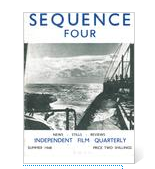Size is irrelevant. Perfection is not an aim.
An attitude means a style. A style means an attitude.
[From the FREE CINEMA Manifesto, 1956]
A sequence works in a way a collection never can.
SEQUENCE is an experimental, peer-reviewed, media, film and music studies serial publication. Its title reflects the different kinds of sequencings currently being researched and practiced in the School of Media, Film and Music, University of Sussex, hosts to REFRAME, the publisher of SEQUENCE.
 But its name and logo also nod appreciatively to the style and attitude of another SEQUENCE serial, the famous old British film journal pictured here, founded in 1947 by Lindsay Anderson, Gavin Lambert and Karel Reisz, which ran until 1952. This journal very much inspired the manifesto of the Free Cinema movement in the latter part of that decade, authored by Anderson, Lambert and Reisz, alongside filmmaker Lorenza Mazzeti. Free Cinema was, famously, a movement that operated “outside the framework of the film industry” and in which the “filmmakers made a virtue of [their] financial and technological limitations” [Christophe Dupin, BFI Screenonline: ‘Free Cinema’].
But its name and logo also nod appreciatively to the style and attitude of another SEQUENCE serial, the famous old British film journal pictured here, founded in 1947 by Lindsay Anderson, Gavin Lambert and Karel Reisz, which ran until 1952. This journal very much inspired the manifesto of the Free Cinema movement in the latter part of that decade, authored by Anderson, Lambert and Reisz, alongside filmmaker Lorenza Mazzeti. Free Cinema was, famously, a movement that operated “outside the framework of the film industry” and in which the “filmmakers made a virtue of [their] financial and technological limitations” [Christophe Dupin, BFI Screenonline: ‘Free Cinema’].
SEQUENCE will use its position outside of established academic publishing frameworks to work adaptively and responsively, using a sequential edited-collection format – its publication schedule set by its authors and readers, and their research and concerns. In other words, it will make an open-access virtue of its own low-fi, D.I.Y., modular blog format. It can only do this meaningfully, of course, because of the generous labour and research expertise of its authors, and of the editorial and advisory boards of its publisher REFRAME.
Each new scholarly SEQUENCE will begin with the publication of one valuable contribution to research in the fields of media, film or music – on a particular theme named in the issue title. But the editors of each individual SEQUENCE won’t necessarily know what the next in their series will be, or when exactly it will come. Each SEQUENCE could, theoretically, turn out to be ‘infinite’, or only as long as the first, self-contained contribution – a hopefully interesting and worthy, if possibly melancholic, kind of monograph.
In any case, each contribution to a SEQUENCE, and each evolving SEQUENCE as a whole, will go on to be published in a variety of electronic viewing and reading formats, with the web version only the first in a series of digital iterations.
Instead of regularity, we aim above all for spreadability and engagement. Readers will find out about new SEQUENCES, and new contributions and updates to existing SEQUENCES through the paraphernalia and pullulations of contemporary online serial publication: primarily, the project’s blog, its RSS feeds, and its Twitter and Facebook pages, and, hopefully, sharings on from those.
We are very honoured, indeed, that the first contribution to the first ever SEQUENCE — 1.1 (2012): Planet Melancholia — is a long essay by film theorist, philosopher and open-access publishing proponent Steven Shaviro: ‘MELANCHOLIA, or, The Romantic Anti-Sublime‘. His work for us is a great and very wide-ranging study of Lars von Trier’s 2011 film, one that touches on object-oriented ontology, feminist representation, contemporary film melodrama, the Sublime, non-normative filmmaking, as well as the end of the world. A tremendously fitting beginning. We thank him for it.
As with each new SEQUENCE, we invite sequential scholarly responses to the first entry in this, the inaugural instalment of our new serial. Shaviro’s article, then, also constitutes a marvellous Call for Contributions for further Planet Melancholia instalments, as well as for further ideas about, and concrete proposals for new SEQUENCES to come.
If you’re inspired to respond to, or to propose, a SEQUENCE, please get in touch with us at SEQUENCEserial[at]gmail[dot]com. Responses and research proposals of all kinds, including contributions in multimedia formats, are very much encouraged. But it would be worthwhile to discuss any substantial idea with us at an early stage in your thought processes. Please note that all contributions will be formally peer-reviewed, and all comments added at the SEQUENCES, while very much encouraged, will be moderated.
Let SEQUENCE unfold.
Catherine Grant
Founder and, with Russell Pearce, co-editor of SEQUENCE
September 2012
